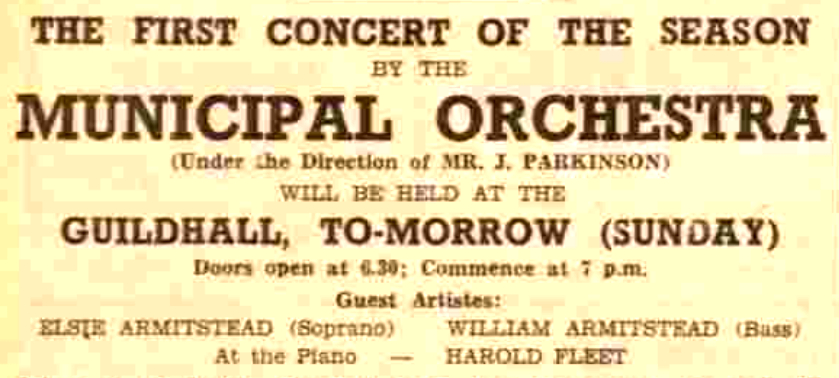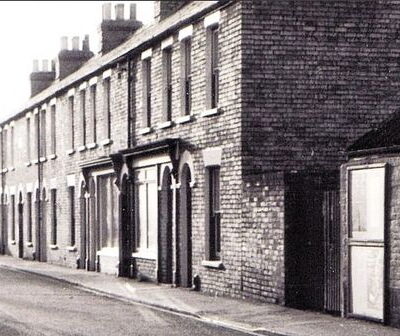Search by topic
- archaeology
- Building of Local Interest
- charity
- church
- crime
- dressmaker
- fire
- Great Eastern Railway
- Listed building
- Mapping Relief
- medieval
- oral history
- poverty
- Public House
- Rattee & Kett
- Religious House
- Roman
- scholar
- school
- Then and Now
- tudor
- women
- work
- world war one
- world war two
Search by text
2 Milford Street
A railway fireman and a family of bakers and confectioners
2 Milford Street is in a terrace of 11 houses on the south side of the street, with a plaque reading Clara Terrace 1869. The terrace was built by property developer and coach builder John Burford, and he named it after his daughter.
1871 census
William Smith, head, 26, engine fitter’s labourer, Bury St Edmunds, Suffolk
Ann Smith, wife, 25, Kirtling, Cambridgeshire
Alfred E Smith, son, 1, Cambridge
1881 census
William Smith, head, 36, fireman Great Eastern railway, b. Bury St Edmunds, Suffolk
Anne Smith, wife, 35, b. Girton, Cambridgeshire
Alfred E. Smith, son, 11, scholar, b. Cambridge
Henry Thodan, lodger, 20, labourer, b. Cottenham Fen, Cambridgeshire
In 1879 William Smith signed a petition asking for sewers to be built in Milford Street.
In 1891 there was no census entry for 2 Milford Street. During the 1880s the corner house next door, 1 Milford Street, became a baker’s shop, with a purpose-built bakehouse facing Sturton Street. The Patten family who ran the shop lived at 1 and 2 Milford Street, which had an interconnecting door. From 1901 the two houses were listed as a single dwelling.
1891 census for 1 Milford Street
John Patten, head, 40, baker & grocer, b. Yeovil, Somerset
Mary E Patten, wife, 52, grocer, b. Cambridge
William J Clarke, stepson, 23, grocer’s assistant, b. Cambridge
Henry G Clarke, stepson, 21, clerk, b. Wymondham, Norfolk
Percy J Clarke, stepson, 16, baker’s boy, b. Wymondham, Norfolk
Mary E Patten, daughter, 10, scholar, b. Cambridge
John H Patten, son, 8, scholar, b. Cambridge
John* Patten was from the borders of Dorset and Somerset, brought up in a turnpike cottage on the main road between Sherborne and Yeovil. He trained as a confectioner.
By 1879 he was living in Cambridge, where he married Mary Clarke (née Hopkins), a widow with three sons. Mary was already an experienced shopkeeper, having helped her first husband run a grocery in Wymondham, Norfolk. By 1891 they had taken on the corner shop and bakery at 1 and 2 Milford Street. Mary’s sons took on roles in the family business. As the Pattens/Clarkes were a blended family, it is possible that the adult stepsons lived above the shop at #1 and the parents and younger children at #2.
1901 census for 1 and 2 Milford Street
John Patten, head, 46, baker and breadmaker, b. Sherborne, Dorset
Mary Patten, wife, 61, b. Cambridge
Mary Patten, daughter, 20, b. Cambridge
John H Patten, son, 19, photographing assistant, b. Cambridge
William Clarke, stepson, 32, breadmaker, b. Cambridge
1911 census for 1 and 2 Milford Street
John Patten, head, 56, baker and confectioner, b. Sherborne, Dorset
Mary Elizabeth Patten, wife, 71, b. Cambridge
William John Clarke, stepson, 43, baker and confectioner, b. Cambridge
Edward Walter Nichols, son-in-law, 29, carpenter, b. St Faith, Norfolk
Mary Elizabeth Nichols, daughter, 30, assistant in business, b. Cambridge
Olive Clara Nichols, granddaughter, 2, b. Cambridge
John and Mary Patten: married 31 years, 2 children of which 1 died
Edward and Mary Nichols: married 3 years, 1 child
Edward Nichols worked for Kerridge’s building works in Sturton Street. The company was engaged in Government work during the First World War, and in July 1917 Edward was granted temporary exemption from conscription: ‘Mr Kerridge said Nichols was the only fully skilled wood-working machinist except one in his works. If this man was taken he would have no reserve machinist’ (Cambridge Daily News, 18 July 1917, referring to Walter Edward Nichols).
In 1918, after his wife’s death in 1916, John Patten married Edward’s aunt Charlotte Nichols, a dressmaker who had lived across the street for many years, at #15 and then #19. He and Charlotte moved into #8, and he died soon afterwards in 1922.
* At birth his name was registered as Jehu Patten, which is consistent with his parents’ choice of less common Hebrew names for two of his brothers, Gideon and Jabez. He used the name Jehu for the electoral register in Cambridge, but apparently not for census records. A newspaper report of 1890 (Cambridge Independent Press, 4 January 1890, page 8) refers to him as John Patten, so it seems he was widely known as John. However, he became Jehu again for his second marriage and his death certificate.
1921 census for 2 Milford Street
Gerald Victor Aplin, head, 25, grocer & general stores, own account, b. Cambridge
Nora Grace Aplin, wife, 26, home duties, b. Cambridge
Sidney Percy Skilton, step-son, 6, b. Cambridge
Gerald V Aplin’s name appears in trade directories of 1922 as the shopkeeper for 1 Milford Street next door,
1939 England and Wales register
Samuel T Blacktop, 26 February 1897, clerk in butchery
Fanny M Blacktop, 19 October 1896, housewife, shop assistant
Gordon Blacktop, 12 February 1928, at school
In Spalding’s street directory of 1939, S T Blacktop is listed as the shopkeeper at 1 Milford Street. In that year the flat above the shop was occupied by labourer Charles Best and his family.
From the 1950s to the early 1980s the resident was Dora Milner, born 1904 in Hull, Yorkshire. Dora had learning difficulties, and had moved to Cambridge with her parents before the Second World War to be close to her elder sister Elsie, who had settled down here. Dora and her mother moved into the house by 1953, and it is likely then that #1 and #2 became separate dwellings, with the interconnecting door blocked.
Elsie and her husband William Armitstead were members of Cambridge Operatic Society and regularly performed in concerts in the 1930s–1950s.
Sources
UK census records (1841 to 1921), General Register Office birth, marriage and death indexes (1837 onwards), the 1939 England and Wales Register, electoral registers, and local newspapers available via www.britishnewspaperarchive.co.uk.
Contribute
Do you have any information about the people or places in this article? If so, then please let us know using the Contact page or by emailing capturingcambridge@
License
This work is licensed under CC BY-NC-SA 4.0







